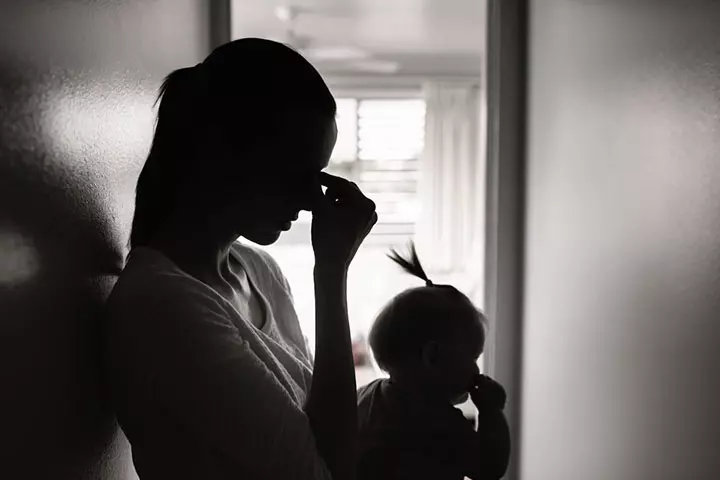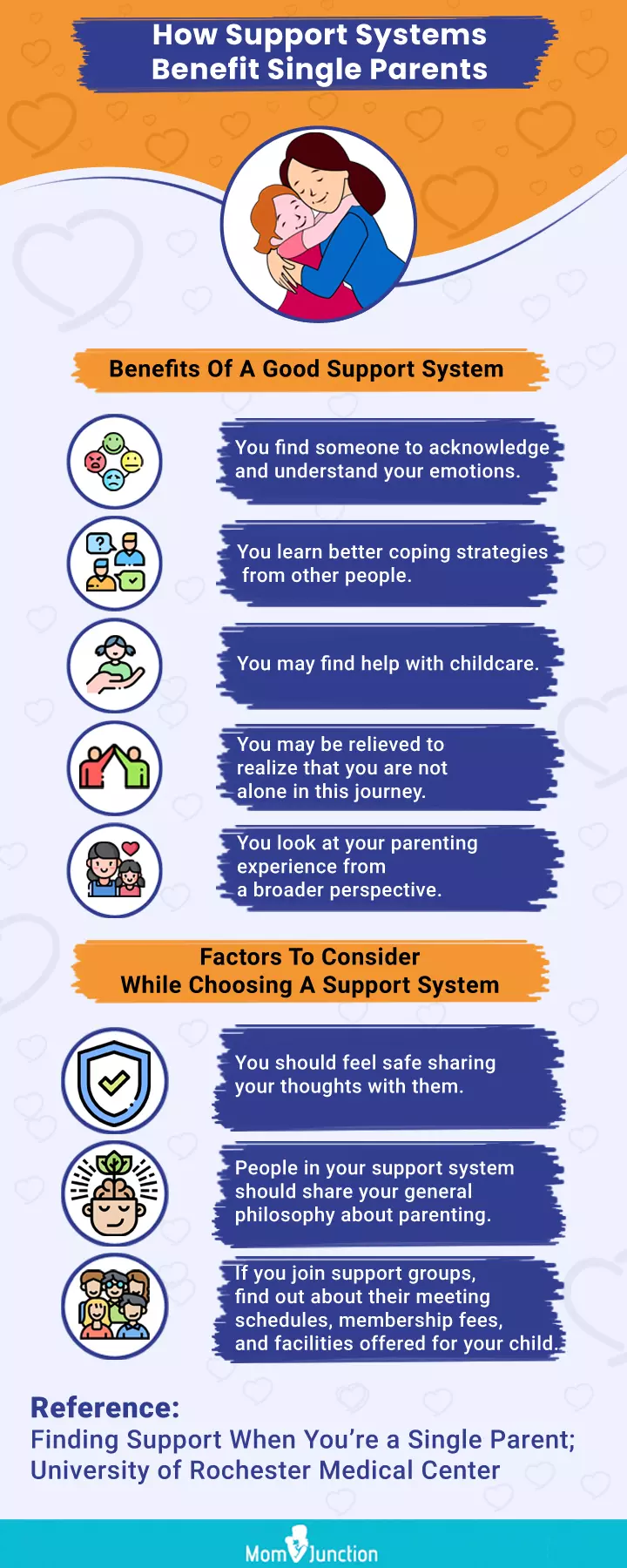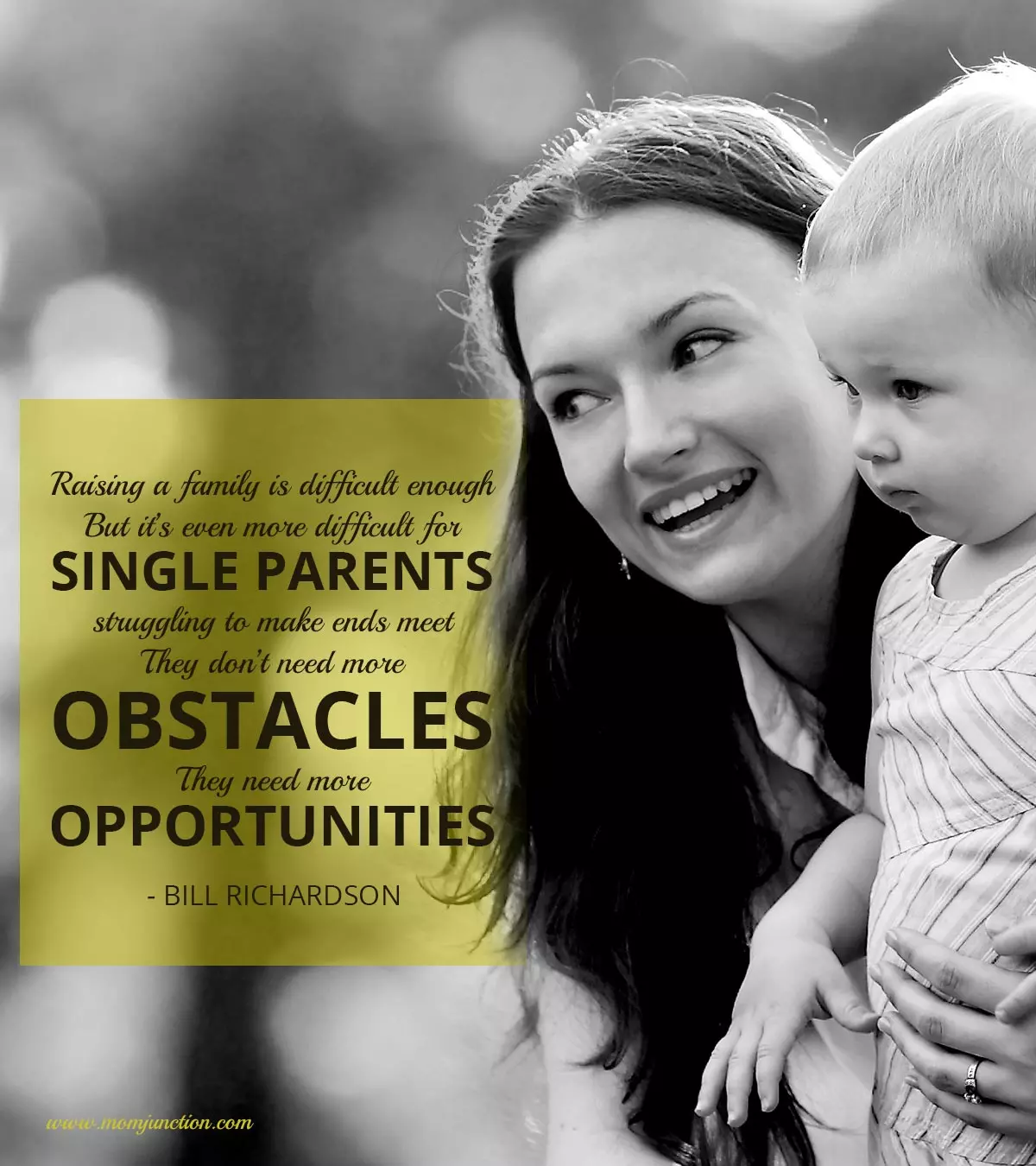
Image: ShutterStock
Single parenting is not a piece of cake. Raising a baby on your own, taking care of all their needs, and taking care of yourself, all at the same time, can be a stressful job. But if you plan it all out effectively, you will be able to carry everything out with ease.

You might face a few challenges during the single parenting period, but they can also be overcome. Read on to know some simple and easy ways to make your single parenting experience fun for you and your child as well.
Key Pointers
- Bringing up a child alone, without the help of a partner, either by choice or due to unfortunate circumstances, can be termed single parenting.
- Challenges of single parenting may be financial strain, lack of emotional support, and juggling childcare and household duties.
- Despite challenges, it can foster strong bonds between the parent and child and promote maturity and a greater sense of responsibility in children.
- Single parenting can be made relatively easy by setting up a routine and ground rules, taking care of yourself, and joining a support group.
Single Parenting – What Is It All About?
Single parenting or single parenthood is a parent bringing up a child or children alone without a partner. The reasons for this can vary. They may have been in a relationship which they left, or their partner might have passed away, or been summoned to an active job. Some women choose to be single parents via surrogacy.
When you go back 500 years, the parenting approach was completely different. There is a phrase that says “It takes a village to raise a child,” which is quite accurate. Then, the child used to have nurturing parents, grandparents, aunts, uncles, and close families. With time and modernization, the ‘village’ shrank, and it still continues to disappear. Human beings have evolved so that the community raises them, but when it is not present, then the dysfunction will potentially develop.
Single Parenting Problems

You might have just become a divorcee, a widow, or separated from your “better half” for some personal reason. Or you may have been a single parent for many years. In any case, the problems you face are not going to vanish magically as some people around you are not ready to change their perspective for you. Single parenting might feel more difficult than co-parenting sometimes. You might or might not face the following issues (1):
- It will be hard to maintain discipline in the home as a single parent will be the only disciplinarian, which can give rise to behavioral problems in children.
- You may feel intense sorrow (and loneliness) when your child envies pals who live with both parents.
- Making new relationships are difficult especially when your little one is jealous or suspicious. The child can feel scared too because there is a new person in the dynamic/picture.
- A single parent may become clingy and rely on the children for company and support, making it difficult for the children to leave the house.
- The various responsibilities of child raising, housework, and earning, will not give the parent enough time for themselves. It results in adding stress, fatigue and pressure. That might cause parents to be more impatient and irritable, which can impact their interactions with their children.
- The income is small which may give less access to child health care. But for single parents who have a decent job, their incomes might still be pretty good. They might actually be able to have good access to child health care because they have more resources.
Let us understand the advantages and disadvantages of single parenting.
Positive Effects Of Single Parenting
Most times, the negative effects of single-parent households are quite apparent; economic troubles and abandonment-related trust issues. But, there are also positive effects on raising a child.
1. Strong Parent-Child Bonding

Spending quality time with your little one creates a unique bond that will be stronger than the one if you were a nuclear parent. It goes well in the case of custodial parents (one who has sole physical custody of the child) and also non-custodial parents who play a significant role in their child’s lives.
- Realize your sole importance and do not try to diminish it.
- If you think your bond is not strong, try to work on it by reading stories together, watching movies, playing your child’s favorite games, etc.
- Your child’s connection with you will not end, and it continues to grow and evolve even after they turn 18.
 Point to consider
Point to consider2. Strong Sense Of Community
Your way of solo parenting suffers when many responsibilities add to your everyday life. Your long hours of working may make you miss your child’s important school functions. You may not afford a babysitter to take out some valuable downtime. You may react more if you see your child being untidy. You may also disclose your personal, professional, or financial issues with your child. But, they will not have the maturity and emotional strength to deal with the situations so as to help you.
Take out some time and find ways to have individual time with each of your children. Have some me-time too; it doesn’t have to be long but may be enough for self-soothing. You might need to learn the skill of time management to juggle through all this with ease.
- Join sole parent support groups
- Involve yourself in your child’s academics
3. Shared Responsibilities
Children raised by single parents will not just have token responsibilities to do, but their contribution to the complete family system is necessary. In this way, children will understand the value of their contribution and can take pleasure in their work. However, there should be a clear parent-child structure and roles and responsibilities so the child doesn’t become responsible age inappropriately.
- Let your children recognize the efforts they put in
- Praise them for doing the house chores
- Be specific while asking them to offer the help
4. Maturity
Children will find their parents working hard, and it will force them to collaborate and work along with their parents. Additionally, the children will also learn to manage their disappointments in life. For children to have these skills, they still need guidance from their single parents. Hence, it’s still a collaboration between the parent and the child, with clear boundaries and structure.
- If you find your child is disappointed, respond with support, empathy and encouragement.
- These experiences will help children become empathetic and caring adults.
- You may not prevent them from feeling disappointed or sad all the time, but you can manage their emotions.
5. Parental Role Modeling

Children brought up in single parent families will realize their importance in their parents’ lives. Let your children balance their needs with needs of the family. Teach them to consider others’ needs as well.
- Let your children balance their needs with the needs of the family.
- Teach them to consider others’ needs as well.
Negative Effects Of Single Parenting
You cannot be the best mom out there, and there may be adverse effects as well. However, your style of parenting, attitude, perseverance, and support system should all go a long way minimizing negative effects like:
1. Financial Troubles
Most single parents work long hours to meet the financial needs of the family. It is necessary to run the household and raise the children. There may be chances when you have to deny your kids from their requirements, and you may have to juggle repeatedly between financial commitments. Your child may thus be not able to take the opportunities he always dreamt of due to financial concerns (1).
2. Low Parenting Quality
Your way of parenting suffers when many responsibilities add to your everyday life. Your long hours of working may make you miss your child’s important school functions. You may not afford a babysitter to take out some valuable down time. You may react more if you see your child being untidy. You may also disclose your personal, professional or financial issues with your child. But, they will not have the maturity and emotional strength to deal with the situations so as to help you.
Take out some time and find ways to have individual time with each of your children. Have some me-time too; it doesn’t have to be long but may be enough for self-soothing.
 Point to consider
Point to consider3. Children After A Divorce
If your reason for single parenting is divorce, your children will also experience adjustment problems or may have the feeling of being ashamed. If your partner stops looking out after your kids as they used to do before, it may give rise to resentment in your children. There are also chances they still hold on to bad memories of your divorce.
If you notice your child having trouble sleeping or experiencing problems at school, you should counsel her or take her for counseling. You should also spend time with the child and give the child the space to grieve.
4. Emotional Problems
Your children are likely to experience self-esteem problems. They may crave affection, which they will not get enough because of your busy schedule. Thus, they may lose expectations in their relationships later in life. or they will actually have more expectation for affection and company down the road but that will not create a healthy dynamic. They will take all the blame for their living conditions. It may be difficult for you to stop them from drawing comparisons, but you can help your children build self-regard. Acknowledging them when they have done something good and posting a card in their room about their worth will help build self-esteem. Another way to help children build self-esteem is to let them take the lead in completing tasks with some challenges. Some single parents have the tendency to jump in too quickly to help their children.
5. Loneliness
Being a lonely single mom or dad is another challenge. They will not only be able to share their difficulties with their spouse but also cannot share their joys as well. If the parent is single because of a spouse’s death or any tragedy, it will be even harder for the parent to bear all sorts of responsibilities.
6. Adjustment Difficulties
Children will also face the issues along with their single parents. There may be a sense of loss, poverty, and continuous exposure to parental arguments. While the parent’s sense of loss is because of the missing spouse, a child’s loss will be a guide or a protector. It will be tougher for children at their young age.
Top 10 Strategies For Single Parents
Raising kids, without the support of your better half, is not an easy thing to do as you have to single-handedly face a fair share of concerns, dilemmas, and other issues. However, don’t lose heart over any issues! You can cope with the stress with a great amount of planning and with these simple tips.
1. Set Up A Routine
Structure your day in such a way that it offers a sense of security to your child. Maintain a relatively consistent mealtime, wake up time and bedtime. If you miss spending time with your kids during the daytime because of your job, do not try to make it up for the night. Letting them stay late at night is not a right approach’ as told by Leah Klungness, Ph.D., a psychologist in Long Island and coauthor of The Complete Single Mother.
Children need to sleep more and as a parent; you need to take some time for your kids to set up a routine (2)
2. Take Care Of Yourself
Your child may observe you being angry, upset or sad when major life issues crop up. It is quite common in all families, be it a single parent or nuclear families. The only thing you should do is to let her know your negative emotions are not because of her, and you love her more than anything else.
If your children are mature enough to understand, share what is affecting you with them. When you express your feelings, they will feel free to express themselves more.
Also, do not discuss grown-up issues like financial problems or conflict with the former partner with your child. It can make her anxious. Share such matters only with other adults who can morally comfort you.
3. Offer Unconditional Love To Your Children

Even after separating from your partner, your kids will still look for the same love and concern they used to get before. They need the same protection, routine, encouragement to learn and support from a loving and trusting parent. It may be hard for you to show the same support and warmth in the initial days, but how can you show her the care?
Make most of the time: You can spend quality time with your little one anywhere and anytime. Chat with her on the way to her school or child care. Talk to her during the dinnertime rather than encouraging her to watch television. Play sing-a-along on a ride, narrate funny short stories at bedtime, play word games, and you can do more.
Pique the interest: Talk to your child about her favorite things, from books to sport to music. Try to awaken the interest by playing her favorite computer game or sport along with her.
Positive attention: Smile with them, laugh with them, and hug them as much as you can. Let them know that you are happy to see them in the morning and when they are back home from school or child care.
One on One time: Try to contribute some time for each child. It may be a walk, reading a book before bedtime, playing a game or talking. You can plan some outings with younger ones when older children are at school.
Praise: Whenever your child achieves something, praise them. Praise them for the way they are growing up and coping. For instance, you may say, ‘I am proud of your result in academics.’
4. Set Ground Rules
You will not have anyone else to back you up, so establishing certain ground rules will help to raise your children without much effort.
Use praise: Look for the ways to praise good behavior in your child. Rewarding with points is the effective way to instill good behavior in them.
Firm and serious voice tone: Interacting in a low voice is an easy tool for better parent-child communication.
Boundaries: Set up some rules that help to know whether the behavior is acceptable or not. Your child should understand if they are crossing limits.
Isolate or redirect: If your child is continuously behaving badly, you have to redirect her ways. If the problem is about television, you should turn it off; or if it is about fighting for toys, snatch them away.
Loss of privileges: Your child should know the cost of misbehavior.
Ignore: If some of the misbehavior is to draw attention, you should ignore it right away.
5. Try Handling Finances
Taking care of the family on a single income or being dependent on the former spouse is one of the toughest aspects of single parenting. It is important for you to understand about long term investments, budget your money accordingly, plan for retirement and if possible you should try to earn more by doing an additional job.
6. Reach Out To Support Groups
It is evident that single parents need help to take care of kids when they are on run to do errands or someone to talk to when they are disturbed. You can ask your extended family and friends to help. You may also join a support group, or hire a babysitter to take care of your little one.
7. Give Honest Replies
It is quite obvious that your child may question you about the other parent or the changes in the family. Try answering them in an honest and open way. Also, offer them the required support and help they require to deal with those emotions.
8. Remove Guilt
You may feel guilty for the things you cannot provide or the time you may spend with your kids. For your good, try to focus on all the things to accomplish for the day and also show love, comfort, and attention to your little ones. If you feel guilty about your separation or the ways that have separated you from your partner, join a support group for counseling.
9. Remain Positive
You may quickly become overwhelmed by the demands and responsibilities of single parenting. You may also suffer the pain of death or divorce of your spouse. Despite all these, you have to stay positive and take care of your mental health as your kids may easily get affected by your moods. Exercise regularly, have enough rest, and maintain a healthy diet to balance your life in all ways. You may share some of the grievances with your kids, but also let them understand they are not the causes of your problems.
10. Set Up Role Models
Children will benefit when you give them examples of some real personalities. Look within your family or friends of any sex to be role models for your kids. Also, set a gathering where the responsible adult spends some quality time with your little one.
Frequently Asked Questions
1. What do single parents need help with the most?
As a single parent, dealing with a child’s emotional needs and issues can be daunting. A working parent would find it difficult when it comes to balancing their personal and work life. Financially dependent parents may need support to fund the child’s education and various needs.
2. What is the hardest thing about being a single mom?
Some of the most challenging tasks a single mom may struggle with are juggling parental duties while attending to the child’s needs and maintaining inner peace and sanity. Although life gets rough and challenging, you can figure out ways to deal with every situation if you are strong emotionally.
3. How can single parents create a nurturing and stable home environment for their children?
The two pillars of creating a nurturing and stable home environment as a single parent are self-awareness and self-care. Self-awareness involves identifying needs and areas requiring assistance in raising a child. Self-care for a single parent would mean seeking support from elders and community members. In addition, establishing routines, prioritizing open communication, and spending quality time are crucial to develop a secure and positive environment for children.
4. How can single parents navigate dating and new relationships while balancing parenting responsibilities?
Dating as a single parent can be tough and may make you wonder when it could be the right time. However, when you find a suitable person, have honest discussions and share your concerns with them. Allow things to progress naturally and unfold at their pace (5).
5. What resources and support services are available for single parents in their community?
A few resources and support services in the US for single mothers include Mercy Housing, Feeding America, Helping Hands for Single Moms, and Salvation Army. Some organizations provide aid, from finances to housing and even career mapping (6).
6. How can single parents encourage a positive co-parenting relationship with their ex-partner?
When parents choose to co-parent, they must set aside negative feelings and think about their child’s wellness and safety. Working as a team to identify the child’s needs and properly communicating with each other will greatly contribute to the child’s positive upbringing (7).
7. What are some potential effects of single parenting on children’s academic performance?
Research suggests that children with single parents are more likely to have fewer economic resources and more family instability, which may lead to a poor educational outcome. Moreover, children with socioeconomic disadvantages are more at risk of living in poverty, which may impede their academic progress (8). However, further research is required to establish these links.
8. How can single parents help their children build healthy relationships and social skills?
Create a lovable and safe environment for your child to build a positive relationship and promote self-assurance. Model affectionate, polite, and respectful social behaviors to encourage your child to follow the same. Instill confidence and motivate children to socialize while being kind and polite towards others (9).
The single parenting journey is not easy and comes with its fair share of complications and challenges. However, there are several benefits to it, such as having a strong bond with your child. Your child may also share your responsibilities better and mature early enough to support you. Remember that it is essential you take proper care of yourself, make the most of the time with your children, and set forth specific ground rules to manage everything more easily manageable. The right set of rules can also ensure that your children grow independent with the right values.
Infographic: Seeking Help In Single Parenting
Single parenting may be overwhelming at times with the responsibility one has to handle. In such circumstances, seeking support becomes essential. This infographic sheds light upon how a good support system may benefit single parents and things to consider while looking for one. Illustration: Momjunction Design Team
Illustration: Positive & Negative Effects Of Single Parenting

Image: Stable Diffusion/MomJunction Design Team
Join the brave journey of a single parent as they share insights and reasons for embracing their path. Discover their heartfelt story in this inspiring and enlightening video.
References
- Rebecca Jayne Stack and Alex Meredith; (2018); The Impact of Financial Hardship on Single Parents: An Exploration of the Journey From Social Distress to Seeking Help.
https://www.ncbi.nlm.nih.gov/pmc/articles/PMC5932102/ - How to Cope with the Stress of Single Parenting.
https://www.utsouthwestern.edu/edumedia/edufiles/about_us/admin_offices/human_resources/eap/single-parenting.pdf - Finding Support When You’re a Single Parent;
https://www.urmc.rochester.edu/encyclopedia/content.aspx?contenttypeid=1&contentid=4581 - Why Safe and Nurturing Environments Matter for your Child’s Growth.
https://scholarsarchive.byu.edu/cgi/viewcontent.cgi?article=1295&context=marriageandfamilies - Single-Parent Dating and Parenting.
https://scholarsarchive.byu.edu/cgi/viewcontent.cgi?article=1295&context=marriageandfamilies - 7 US Charities That Help Single Mothers.
https://ofhsoupkitchen.org/charities-that-help-single-mothers - Co-Parenting and Joint Custody Tips for Divorced Parents.
https://www.helpguide.org/family/parenting/co-parenting-tips-for-divorced-parents - Child Well-Being in Single-Parent Families.
https://www.aecf.org/blog/child-well-being-in-single-parent-families - How Parents Can Support Social Skills in Their Children.
https://growingupnm.org/how-parents-can-support-social-skills-in-their-children/
Community Experiences
Join the conversation and become a part of our nurturing community! Share your stories, experiences, and insights to connect with fellow parents.
Read full bio of Yy Wei
Read full bio of Sagari Gongala
Read full bio of Rebecca Malachi
Read full bio of Apoorva K









